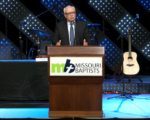Revealing the ‘Rights’ Chameleon
Contributing writer Rodney Kennedy makes the case that the most color-shifting term in our political vocabulary is 'rights.'
The Element of Divine Surprise
Ryan Whitaker’s new film 'Surprised by Oxford,' based on Carolyn Weber’s memoir of the same name, explores what happens when our plans and expectations are thwarted by the vagaries of life.
The Gospel According to Little Blue Truck
Contributing writer Sarah Blackwell makes the case that children are walking around each day speaking the language of the world, so it is powerful when we can take those stories and translate them into our own religious language.
Dishonest Preacher ‘Whac-A-Mole’
Contributing writer Rodney Kennedy argues that Rev. Mark Burns abused the Bible for secular political purposes during a recent ReAwaken America Tour event in order to foment violence and promote insurrection.
Will MBC Messengers Save SBU and HLGU?
Russell Jackson makes the case that the Missouri Baptist Convention’s Executive Director, John Yeats, and its Executive Board have presided over the ruination of two of the three remaining universities affiliated with the MBC.
Disciples Meet to Disrupt Business As Usual
The recent Christian Church (Disciples of Christ) General Assembly demonstrated the growing commitment within the denomination to social justice and inclusion as key Gospel mandates.
Reflecting on the Disciples General Assembly
At the 2023 General Assembly of the Christian Church (Disciples of Christ) in Louisville, Kentucky, one of the smallest Mainline denominations met to discuss some of the church's biggest issues.
The Roman Baptists
Contributing writer Rodney Kennedy argues that Southern Baptists are engaged in a long slow return to Rome in a couple of very particular ways: one pagan and one religious.
The Shock of Israeli Apartheid
Theologian and anti-apartheid activist Allan Boesak reacts to the recent U.S. House of Representatives resolution expressing support for Israel.
The Fragility of Motherhood
Rev. Angela Denker reflects on the unjust and tragic death of sprinter Tori Bowie, one of the fastest women in America.










